How Much Should I Feed My 8 Month German Shepherd
Hepper is reader-supported. When you buy via links on our site, we may earn an affiliate commission at no cost to you. Learn more.
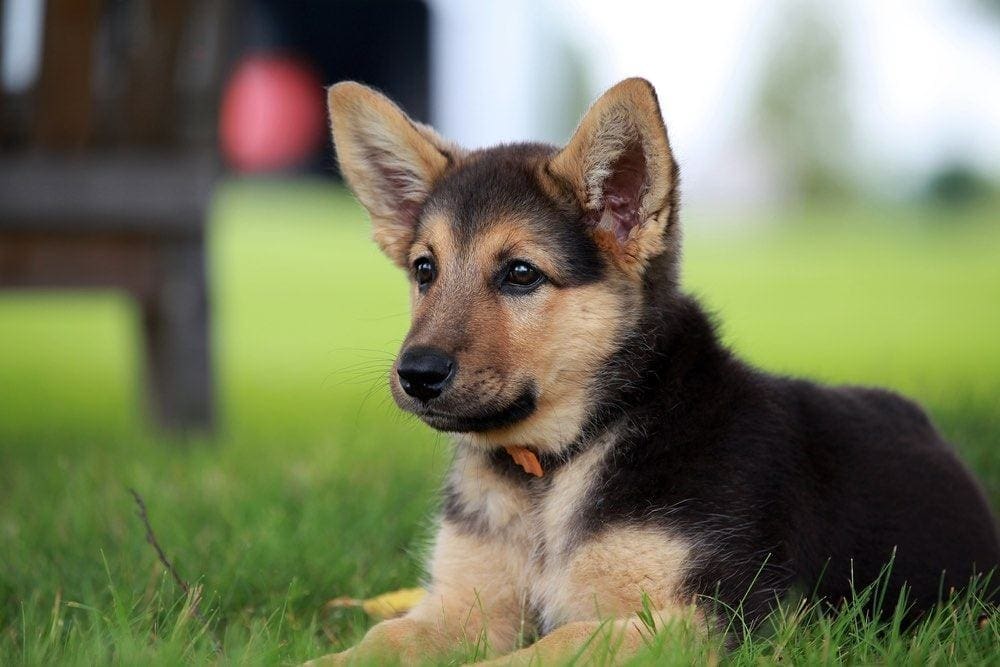
The German Shepherd is a loyal and loving family dog. He is also one of the world's most popular service dogs because he is easy to train, eager to please, and incredibly vigilant. His long hair, large stature, and working background mean that this breed can eat a lot and your German Shepherd Dog (GSD) will need good quality food to maintain everything from strong teeth to healthy bones.
Choose food that offers a nutritional, fully balanced diet, that is appropriate for the stage of life of your Shepherd, and that they enjoy. Expect to feed your adult German Shep around 3 cups of dry kibble per day and use our chart to determine roughly how much you should be feeding your German Shepherd puppy.
How Much to Feed a German Shepherd Puppy — Feeding Chart
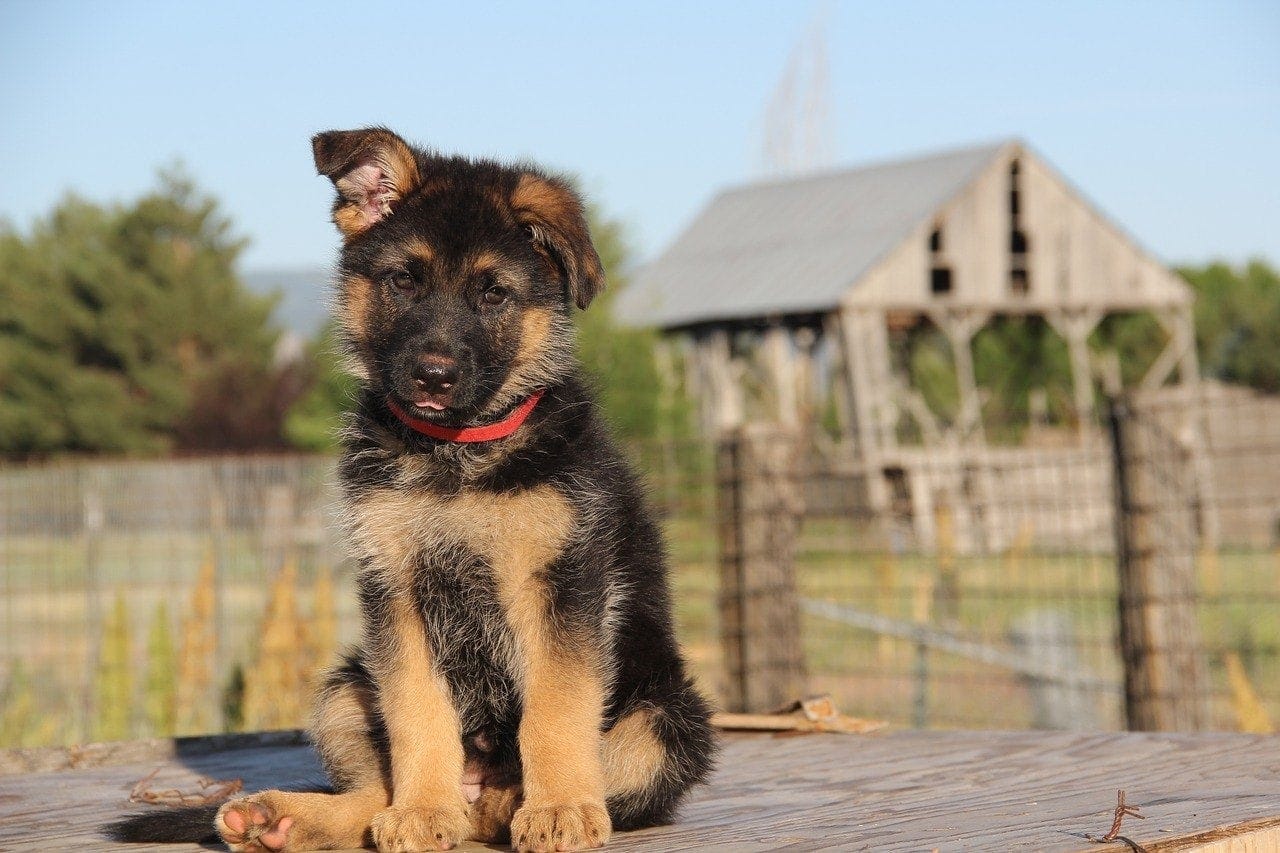
Age of Puppy Quantity of Food Per Day Number of Meals Per Day 2 months 4 oz 3 3 months 6 oz 3 4 months 8 oz 3 5-6 months 10 oz 3 7-8 months 12 oz 3 9-10 months 16 oz 3 10-12 months 24 oz 2
Source: https://dogsnet.com/how-much-to-feed-a-german-shepherd-puppy/
What to Feed My German Shepherd Puppy
German Shepherds are big dogs, and they have a hearty appetite. Although dogs are not obligate carnivores by nature, they thrive on a protein-rich diet. Ideally, most of the protein you feed your GSD will come from animal and meat sources rather than plant sources. Feed a minimum of 22% protein, although we would aim for 25% protein at the very least.
There are three basic types of food you can give a dog, and each has its opponents and proponents:
- Dry Food: Usually comes as a brown kibble and it is cheap, convenient, easy to store, and should contain a full and balanced diet for your dog. The kibble itself, as well as the chewing action required to eat it, can also aid your GSD in maintaining good dental hygiene. However, it doesn't contain a lot of moisture, so your dog is likely to need more fresh water if fed dry food exclusively. You should also check ingredients carefully to ensure that the food incorporates all essential vitamins and minerals and that it has the right protein and other ingredient ratios. We recommend the Merrick Real Texas Beef and Sweet Potato Recipe for your GSD.
- Wet Food: Wet food looks like chunks of meat covered in jelly or gravy. It tends to be more appealing than dry food, to dogs at least, but it doesn't keep as well or as long as dry food. Because the German Shepherd breed loves to chew, feeding wet food alone may not be enough to stave off the desire, so this kind of diet may make your GSD more likely to chew furniture and other items. While dry kibble can be left down most of the day, wet food can form bacteria after a couple of hours. Ideally, it should be lifted and any remnants disposed of after an hour. Wet food can be more expensive, tends to be higher in protein, but it does provide hydration as well as sustenance. We recommend Taste of the Wild Wetlands Grain-Free Canned Dog Food for any German Shepherd.
- Raw Food: The raw food diet is one that causes the greatest controversy. Th is food is made up of raw meat, usually including bones, as well as fruit and vegetables, as well as ingredients like probiotics and other natural additives. Opponents of this diet worry that their dog will get bacteria poisoning from the meat or that they won't give a fully balanced and complete diet. Proponents, on the other hand, say that their dogs have more energy, better-looking coat, and are fuller and more satisfied with their meals. Feeding a raw diet does require more effort on your part, costs more money, and will require research.

Avoiding Underfeeding & Overfeeding
A German Shepherd is a large breed dog and should never be skinny. Although the GSD breed is not necessarily prone to being overweight, this is always a danger if you feed your dog too much, or if he doesn't get enough exercise.
Always ensure that you measure your dog's food, stick to the appropriate amounts, and be careful if you give additional treats and extra food. If you give your dog treats, be sure to remove these calories and fat from their daily food intake. Even though the GSD is a large breed dog, they are still smaller than humans, so it can be difficult to comprehend exactly how much extra food you are giving.
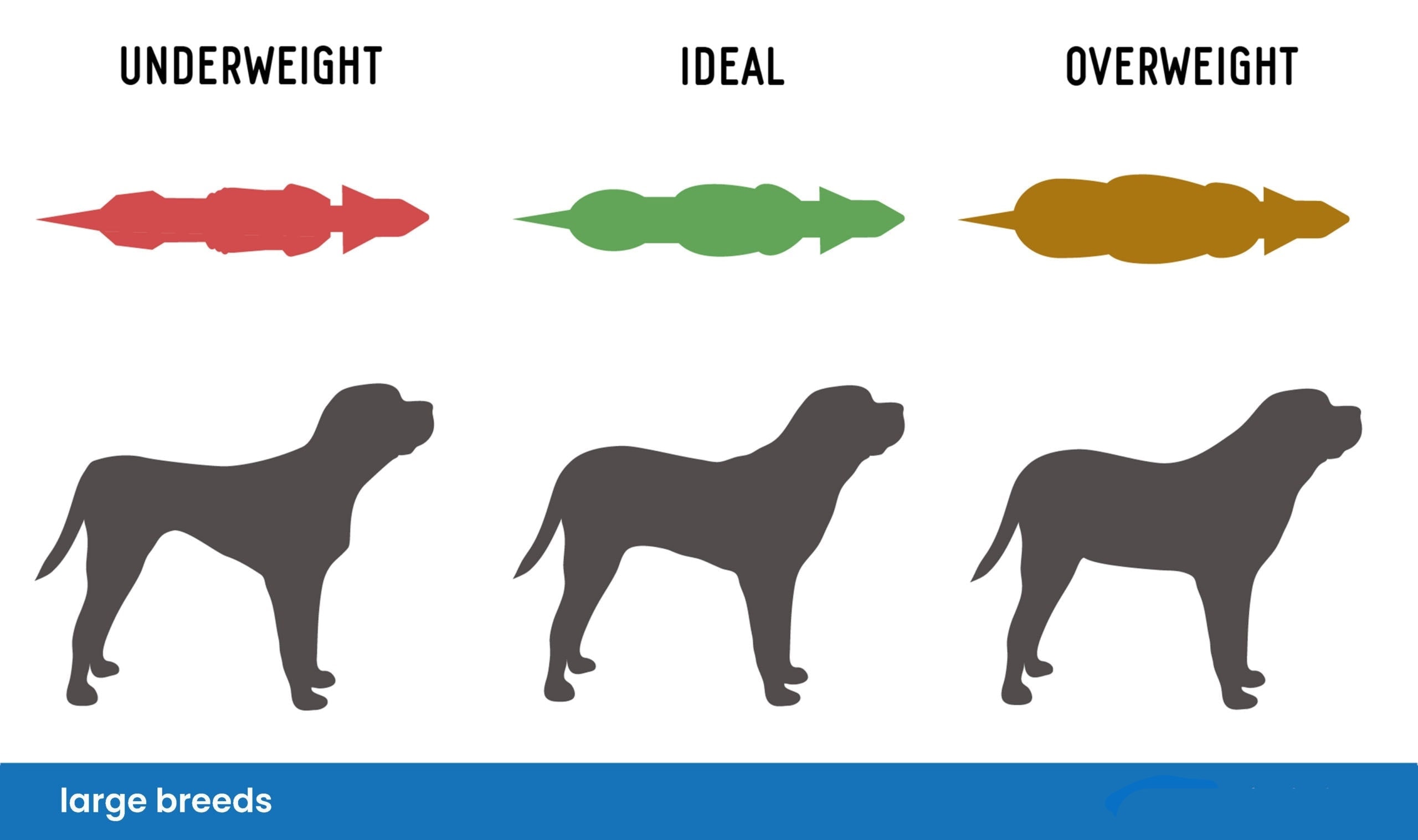
When to Switch from Puppy to Adult Food
Puppy foods tend to contain more nutrients and calories than adult food, to meet the nutritional requirements of your dog. As such, whether you feed a dry or wet variant, the puppy food you give will have higher levels of protein and fat. If you continue to feed this to an adult dog, they will be more prone to put on weight because of the high fat content. Moving over to adult food is an important stage in your dog's development.
Small breed dogs are usually fully mature by around 10 months, medium dogs by 14 months, but large breed dogs can take up to 24 months to fully mature.
With your German Shepherd, wait until he reaches around 80% of his anticipated adult weight before making the transition to adult food.
You should transition from one food to another slowly, rather than simply swapping overnight:
- Feed ¾ puppy food and ¼ adult food for the first week.
- Feed ½ puppy food and ½ adult food for the second week.
- Feed ¼ puppy food and ¾ adult food for the third and final week of the transition.

Why Won't My German Shepherd Puppy Eat?
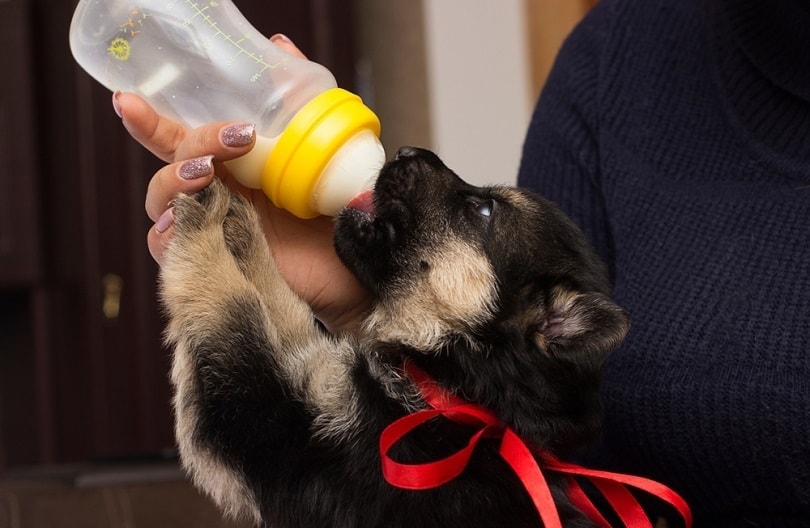
If it does happen to your German Shepherd, it is an obvious cause for alarm, but there are several reasons why a German Shepherd puppy may decide not to eat his food.
- Illness – If your puppy is feeling sick, the last thing they will want is to eat. Illness might include vomiting and diarrhea. It could be a short-term illness or something more serious. You should look for other signs and symptoms of illness and get veterinary help if required.
- Dental Problems – If your dog has dental problems, it could mean that their teeth hurt when they try chewing or biting, and this will make them reluctant to do so. Look in their mouth for signs of cracked, chipped, or broken teeth.
- Teething – Like humans, dogs go through a stage of swapping from their first teeth to adult teeth, and when this happens, it can cause discomfort and pain in the mouth— discomfort that prevents them from eating. Try offering softer foods, and consider putting their food in the fridge for a while before feeding.
- Medication – Some medications can cause nausea, while other medicines may lead to stomach pain. If your dog has recently started a new medication and this coincides with them not wanting to eat, you need to liaise with your vet straight away. They may be able to give a different medication.
- Separation Anxiety – Dogs are social animals, and this is especially true of puppies. Puppies tend to get a lot of attention from their human owners, so if you're leaving your GSD alone while he eats, and he is used to receiving attention all the time, he may be suffering separation anxiety that prevents him from eating. Feed your dog when you're at home, and try to give him plenty of chances to eat before going out and leaving him.
- Time o f Day – It could simply be the case that your dog does not want to eat first thing in the morning or last thing at night. Try feeding at a different time of day.
- Spoiled Food – Wet food has a relatively short shelf life, and once it has been opened and served, your dog should eat it quickly. Wet food should usually be taken away within an hour or two of it being served. If it is spoiled, your dog will turn his nose up at the food.
- Stress – Stress is a major appetite suppressant in dogs, just as it is in humans. Whether you've got a new puppy, moved house recently, or even if your puppy feels like he is being pressured when he is eating, it may put him off and prevent him from eating everything. Reduce stressors from your dog's life, where possible, and consider feeding supplements or getting anti-anxiety medication if your puppy is adversely affected by anxiety.
- Picky Eaters – Some dogs will eat just about anything, whether it is meant as food or not. Others are incredibly picky eaters with dietary requirements to match the harshest food critic. Some combine these elements, so they will eat any garbage snack they can lay their teeth on but will only eat specific foods. Experiment with foods and always transition your puppy from one food to another slowly.
How Much to Feed an Adult German Shepherd
Feed your adult GSD between 2.5 and 3.5 cups of dry kibble per day.
Active male dogs should be eating at the upper end of this scale, so should be getting 3.5 cups. Inactive and older dogs, who need less food, should be eating 2.5 cups.
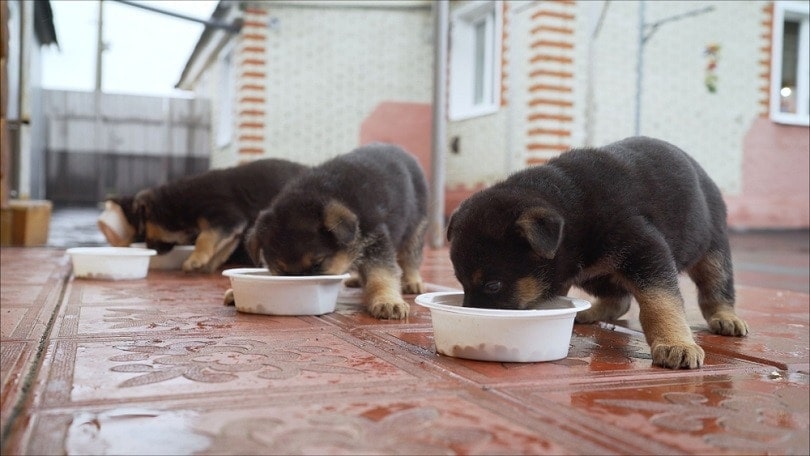
German Shepherd Feeding Guide for Seniors
Senior dogs tend to be more sedentary. They exercise less, burn off less energy, and their bodies do not need the same vitamins and nutrients as younger adult dogs or puppies. No age limit determines when a dog is considered to be senior. Owners will recognize when their dog's behavior changes. Your GSD will be less inclined to want to walk, will be less interested in chasing things, and may not want to play as much or for as long.
You can carry on feeding a good quality adult food, or you can move to a senior food that is specifically designed for this time in your dog's life, with the right levels of protein, calcium, and other ingredients. We suggest Wellness CORE Grain-Free Senior Deboned Turkey Recipe Dry Dog Food for your older GSD.

Why Is My German Shepherd Always Hungry?
German Shepherds tend to have a healthy appetite so it can feel like they eat a lot. If you ensure that the food you give is properly measured and that you have chosen food that is suitable for large breeds, then the following are reasons that your GSD could be showing signs of being hungry all the time.
- Lots o f Exercise – The more exercise your dog gets, the more energy they burn off, and the greater their requirement for food to replenish this energy source. One hour of moderate exercise per day is considered a minimum for this breed. Any more than this and your German Shepherd may require more food.
- Anxiety a nd Stress – Anxiety and stress not only cause a lack of appetite but may lead to stress eating. Find out what is causing anxiety in your dog, and remove these stressors.
- Illness – Diabetes, Cushing's disease, malabsorption syndrome, and SIBO are some of the illnesses that can cause your dog to want to eat more. Look for other symptoms of illness and consult with your vet if your dog is showing any signs.
- Bad Habits – Dogs are creatures of habit, and this means that they will benefit from having set meal times and routines. Try to feed your dog at the same time every day. If you feed a meal early, they may still expect food at their usual allotted time.
What Foods Are Bad for German Shepherds?
It can be very tempting to drop a morsel of your food, or sneakily hand a human treat to your dog when you're sat enjoying a quick snack.
However, certain human foods are considered very unhealthy for dogs. Always check before feeding human food to your dog, and avoid the following snacks at all costs because these are toxic for your dog:
- Chocolate
- Grapes
- Raisins
- Avocado
- Garlic
- Onions
- Various mushrooms
- Xylitol
- Caffeine
- Macadamia
- Cooked bones

Conclusion
The German Shepherd is a large breed dog that enjoys plenty of exercise and has an equally demanding dietary requirement. Choose between dry, wet, or raw food, or a combination of these, feed your puppy according to their age but also their size, energy levels, and whether they have any health complaints. Move to an adult appropriate food when they are approximately one year of age, and a senior food when they wind down for their golden years. Good quality food and a regular feeding schedule will help your dog maintain a healthy body and stave off illness, and we hope that our feeding guide has helped give you the information you need for feeding your GSD.
Featured image credit: Lurin, Shutterstock
Related Articles
Further Reading
Vet Articles
Latest Vet Answers
The latest veterinarians' answers to questions from our database
Source: https://www.hepper.com/how-much-to-feed-a-german-shepherd/
Post a Comment for "How Much Should I Feed My 8 Month German Shepherd"